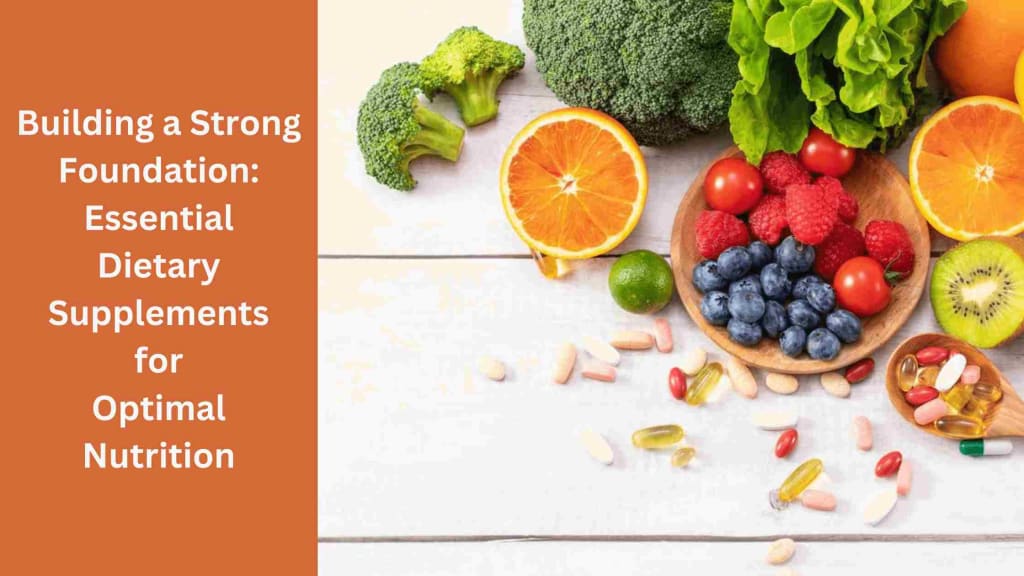Building a Strong Foundation: Essential Dietary Supplements for Optimal Nutrition
Maintaining a healthy and balanced diet is the cornerstone of good nutrition.

Building a Strong Foundation: Essential Dietary Supplements for Optimal Nutrition
Introduction:
Maintaining a healthy and balanced diet is the cornerstone of good nutrition. However, our modern lifestyles and dietary choices can sometimes leave nutritional gaps that may impact our overall well-being. That's where dietary supplements come into play. These supplements can serve as valuable additions to our daily routine, helping to bridge those nutritional gaps and support optimal health. In this article, we will explore some essential dietary supplements that can help you build a strong foundation for optimal nutrition.
Multivitamins:
Multivitamins are a convenient and comprehensive way to ensure you are getting a wide range of essential vitamins and minerals. They typically contain a blend of vitamins A, C, D, E, K, as well as B-complex vitamins, and minerals like calcium, magnesium, zinc, and iron. Multivitamins can help support overall health, fill nutrient deficiencies, and provide a boost to your immune system.
Omega-3 Fatty Acids:
Omega-3 fatty acids are essential fats that play a crucial role in maintaining cardiovascular health, brain function, and reducing inflammation in the body. They are commonly found in fatty fish like salmon and mackerel, but many people may not consume enough of these foods regularly. Omega-3 supplements, usually derived from fish oil or algae, can be a convenient way to ensure an adequate intake of these beneficial fats.
Vitamin D:
Vitamin D is often referred to as the "sunshine vitamin" because our bodies can synthesize it when exposed to sunlight. However, many people do not get enough sun exposure, especially during the winter months or if they live in regions with limited sunlight. Vitamin D is crucial for bone health, immune function, and mood regulation. Supplementation can be particularly important for those with limited sun exposure or specific risk factors for deficiency.
Calcium:
Calcium is essential for strong bones and teeth, proper muscle function, and nerve transmission. While dairy products are often considered the primary source of calcium, some individuals may have dietary restrictions or preferences that limit their intake. Calcium supplements, in conjunction with a balanced diet, can help ensure adequate calcium levels for optimal bone health.
Probiotics:
Probiotics are beneficial bacteria that support a healthy gut microbiome. They aid in digestion, enhance nutrient absorption, boost the immune system, and promote overall gut health. Probiotic supplements can be especially useful for individuals with digestive issues, those on antibiotics, or those looking to maintain a balanced gut flora.
Iron:
Iron is an essential mineral that plays a vital role in oxygen transport and energy production. Iron deficiencies can lead to fatigue, weakness, and impaired cognitive function. While iron is found in foods like red meat, beans, and leafy greens, some individuals, such as vegetarians or those with certain medical conditions, may struggle to meet their iron needs through diet alone. Iron supplements, when recommended by a healthcare professional, can help address iron deficiencies.
Vitamin B12:
Vitamin B12 is crucial for nerve function, DNA synthesis, and the production of red blood cells. It is primarily found in animal-based foods, making it a nutrient of concern for vegetarians, vegans, or individuals with absorption issues. Vitamin B12 supplements can help maintain optimal levels, especially for those at risk of deficiency.
Remember, supplements should complement a balanced diet, not replace it. It is important to consult with a healthcare professional before starting any new supplements, as they can provide personalized recommendations based on your individual needs and health status. Additionally, they can help you determine the appropriate dosage and ensure there are no interactions with any medications you may be taking.
Conclusion:
While a well-rounded diet should be the primary focus for meeting nutritional needs, dietary supplements can be valuable additions to support optimal nutrition. Multivitamins, omega-3 fatty acids, vitamin D, calcium, probiotics, iron, and vitamin B12 are essential supplements that can help fill nutritional gaps and promote overall well-being. Remember to prioritize quality natural supplements and consult with a healthcare professional to ensure you make informed choices that align with your specific needs. With a strong foundation of optimal nutrition, you can enhance your overall health and vitality for a thriving lifestyle.
Disclaimer : These statements have not been evaluated by the Food and Drug Administration. These products are not intended to diagnose, treat, cure, or prevent any disease.





Comments
There are no comments for this story
Be the first to respond and start the conversation.